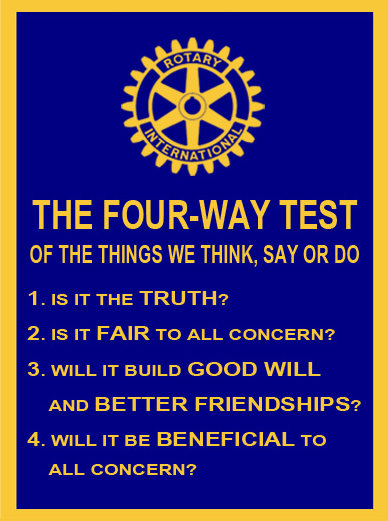When I became an independent public relations consultant and established Margaux & Associates in 2000, I viewed the Code of Ethics of the Public Relations Society of America as central to the way I interacted with clients and other professionals. In submitting proposals, I felt it was important to reference my adherence to PRSA’s code of professional standards.
Upon reflection, do clients know what that means? Do they ask? Honestly, no.
After almost 20 years and the long awaited relaunch of the Margaux & Associates website, I’d like to do a better job of explaining what this means in my role as a business professional, volunteer, family member and citizen of the world.
What I overlooked for too long was the brief code of ethics used by Rotarians called The 4-Way Test. Soon after becoming a Rotarian in 1994, I learned about the history of this simple recitation “of the things we think say or do.” It was written in 1932 by Rotarian Herbert J. Taylor when he was asked to take charge of a company facing bankruptcy. He created it for employees to follow in their business and professional lives and for the survival of the company. It has since been translated into more than a hundred languages and distributed to millions of people worldwide, including school children.

Whether a public relations professional, client or vendor, I invite you to consider the following points of The 4-Way Test as it applies to the PRSA Code of Ethics.
First – Is it the TRUTH?
Honesty is one of the fundamental values of public relations professionals who are held to the highest standards of accuracy and truth in advancing the interests of those we represent and in communicating with the public. It applies to the core principle of protecting and advancing the free flow of accurate and truthful information. It is essential to serving the public interest and contributing to informed decision making in a democratic society.
Second – Is it FAIR to all concerned?
Fairness is another core value public relations professionals must follow in dealing with clients, employers, competitors, peers, vendors, the media and the general public. Fairness goes hand-in-hand with respect for all opinions and support for the right of free expression. Fairness also applies to the core principle of promoting respect and fair competition among public relations professionals. We serve the public interest by providing businesses and organizations with the widest choice of practitioner options.
Third – Will it build GOODWILL and BETTER FRIENDSHIPS?
This applies to the core principle of trust. To earn client trust, public relations professionals must safeguard the confidences and privacy rights of present, former and prospective clients and employees. Another core principle is avoiding real, potential or perceived conflicts of interest in order to build the trust of clients, employers and the publics. At the same time, it is important to build trust with the public by avoiding or ending situations that put one’s personal or professional interests in conflict with society’s interests.
Fourth – Will it be BENEFICIAL to all concerned?
When public relations professionals serve the public interest by acting as responsible advocates for those we represent, we provide a voice in the marketplace of ideas, facts and viewpoints to aid informed public debate.
In closing, you may ask why I haven’t provided a public relations example or scenario to answer each of the questions of The 4-Way Test. Certainly after working many years in this profession, there are plenty to share. Going forward, I plan to do.
In the meantime, I invite you to submit your comments or questions about situations you’ve faced that would benefit from The 4-Way Test and the PRSA Code of Ethics.
You can reach me at mblohm@margauxpr.com.
Gratefully yours,
Margaret Blohm, APR
